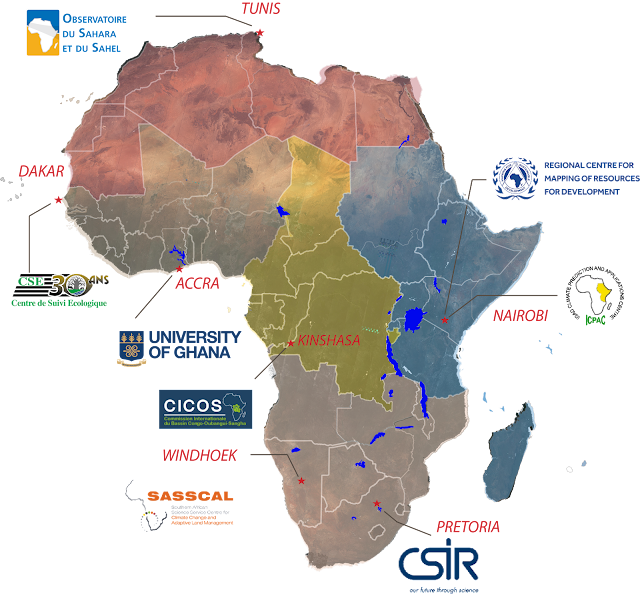GMES and Africa: Stakeholders deliberate on the deployment of EO in support of natural resource management
The GMES and Africa program is embarking on a chain of three thematic workshops, from March to May, 2023. Organized in conjunction with regional partners, the workshops support engagement, the exchange of know-how and experience sharing among stakeholders

The AUC assists member states in promoting their national cross-sectoral networks through the holding of regular interactive platforms through regional, services and stakeholder workshops and forums.
Thematic areas targeted by the workshops are those related to the services offered by GMES and Africa in terms of application of EO to support natural resources management. They include Land and Water Services, with two workshops focusing in March 2023 on the monitoring and management of land degradation (Rabat) and wetlands and flooding (Nairobi); and Marine Services, where one workshop will center in May 2023 on marine and coastal resources monitoring.
Similarly, African coastal habitats accommodate important natural resources which are vital for the socio-economic lives of coastal communities and help to maintain a balanced ecosystem. But these are threatened by rapid urbanization in coastal areas, sea level rise, coastal erosion that is endangering fauna and destroying building, tourist facilities, historic and cultural sites and infrastructure, among others.
Two GMES and Africa “marine” consortia are offering services and products to support a better management of the Marine and Coastal resources. They are the University of Ghana-led consortium for Western and Northern African countries, and the CSIR-led consortium for Southern Africa and Western Indian Ocean countries.

The GMES and Africa 8 regional implementing institutions
The GMES Support Program and Africa
The Global Monitoring for Environment and Security in Africa (GMES and Africa) is a flagship program of the African Union Commission (AUC) implemented in partnership with the European Commission. The program involves over 160 African institutions in 46 African countries. It aims to build African capacity in the use of Earth Observation and satellite imagery to produce spatial data and information. These will support economic and environmental development, social development through the security of goods and people, as well as strengthening of sovereignty.The AUC assists member states in promoting their national cross-sectoral networks through the holding of regular interactive platforms through regional, services and stakeholder workshops and forums.
The GMES and Africa Stakeholders Workshops
The Stakeholders workshops bring together policy makers, researchers and experts from the consortia and institutions that implement GMES and Africa services. The aim is to develop an integrated approach to the use of Earth Observation (EO) for monitoring land degradation in Africa. Among the objectives is to help update operational roadmaps and develop appropriate training activities and communication plans.Thematic areas targeted by the workshops are those related to the services offered by GMES and Africa in terms of application of EO to support natural resources management. They include Land and Water Services, with two workshops focusing in March 2023 on the monitoring and management of land degradation (Rabat) and wetlands and flooding (Nairobi); and Marine Services, where one workshop will center in May 2023 on marine and coastal resources monitoring.
Land degradation
Africa is particularly vulnerable to land degradation and desertification, being the most severely affected by the two phenomena. Desertification affects about 45% of African land and 55% of this land is at high or very high risk of further degradation. Two GMES and Africa-supported consortia are offering data and services in the area of land degradation: the OSS-led Consortium for Northern Africa, and the RCMRD-led Consortium for Eastern Africa.Wetlands
Africa’s wetlands ecosystems are estimated to cover more than 131 million hectares. They deliver a wide range of ecosystem services that contribute to human well-being. Wetland monitoring is in the portfolio of five of the eight GMES and Africa consortia, among which four are offering data and services for wetlands monitoring. These include the CSE led-consortium for Western Africa, the CICOS led consortium for Central Africa, the RCMRD led consortium for Eastern Africa, and the SASSCAL-led consortium for Southern Africa.Flooding
Over the last decades, Africa faced the menace of recurrent flooding. In 2022, 8.5 million people were affected in 20 countries in the West and Central African regions, and the WFP had to disbursed US$ 9.4 million to implement a response plan in Mauritania, Mali, and Burkina Faso. The GMES and Africa consortium in Western Africa led by CSE is working on a regional system to monitor flooding events in support of populations and national services.Marine and coastal areas
Coastal and marine resources form an integral part of the socio-cultural and economic well-being of coastal countries in West Africa. Fishing creates employment and generates income from trading in high value fish. Fish is the main source of animal protein for many West Africans and three million people are directly or indirectly employed in the fishing industry. However, the gain from this resource is presently threatened by poor management practices, as well as illegal, unregulated and unreported (IUU) fishing, increasing climate change, pollution from shipping and oil exploration and exploitation.Similarly, African coastal habitats accommodate important natural resources which are vital for the socio-economic lives of coastal communities and help to maintain a balanced ecosystem. But these are threatened by rapid urbanization in coastal areas, sea level rise, coastal erosion that is endangering fauna and destroying building, tourist facilities, historic and cultural sites and infrastructure, among others.
Two GMES and Africa “marine” consortia are offering services and products to support a better management of the Marine and Coastal resources. They are the University of Ghana-led consortium for Western and Northern African countries, and the CSIR-led consortium for Southern Africa and Western Indian Ocean countries.











Comments
Post a Comment